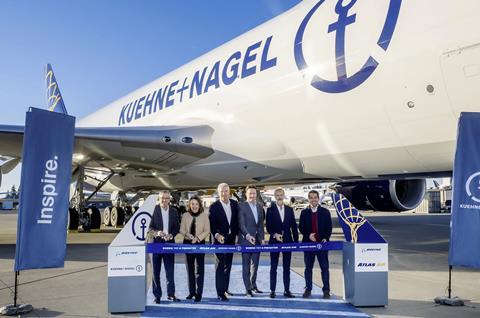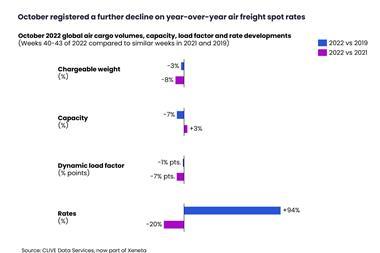
Kuehne+Nagel (K+N) has started dedicated freighter operations through a partnership with lessor Atlas Air.
In total, the freight forwarder will charter two brand-new B747-8 freighters from the lessor.
The first of the two was named "Inspire" at a handing-over ceremony at the Boeing Everett Delivery Center in Everett.
The two B747s are the last of the famous jumbo jets that will be built by Boeing.
K+N said the aircraft would be utilised on transpacific services and also linked to its intra-Asia network to provide better connectivity in the growing Asia Pacific region.
Yngve Ruud, member of the management board of K+N, responsible for Air Logistics, said: "It is a very special moment for us to see K+N 747-8F 'Inspire' taking off.
"Together with the very last 747-8F that we named 'Empower', the aircraft will support our customers with reliable and flexible solutions globally, continuing the legacy of the most incredible aviation programs in history.
"We are delighted to celebrate this day with our partners Atlas Air and Boeing and looking forward to see our aircraft connecting the world."
John Dietrich, president and chief executive, Atlas Air Worldwide, added: "We are very pleased to provide their first dedicated aircraft which will proudly fly in custom Kuehne+Nagel livery.
"The two 747-8Fs we will operate for Kuehne+Nagel will add more capacity and versatility for their network."
The addition of a dedicated freighter operation comes at an interesting time for the industry as capacity shortages have eased due to volume declines and the return of bellyhold capacity.
However, one air cargo executive recently told Air Cargo News that certain markets, such as China, still face constraints as bellyhold capacity has yet to recover due to ongoing restrictions.
Chief executives at the recent Air Cargo Forum (ACF) in Miami were also optimistic that overcapacity would not be a long-term issue.
Meanwhile, Boeing pointed out in its recent market forecast that following Covid companies are likely to rely on freighters to help mitigate the risk of disruption to supply chains.














